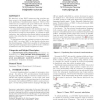Free Online Productivity Tools
i2Speak
i2Symbol
i2OCR
iTex2Img
iWeb2Print
iWeb2Shot
i2Type
iPdf2Split
iPdf2Merge
i2Bopomofo
i2Arabic
i2Style
i2Image
i2PDF
iLatex2Rtf
Sci2ools
127
click to vote
DOCENG
2003
ACM
2003
ACM
Lazy XSL transformations
We introduce a lazy XSLT interpreter that provides random access to the transformation result. This allows efficient pipelining of transformation sequences. Nodes of the result tree are computed only upon initial access. As these computations have limited fan-in, sparse output coverage propagates backwards through the pipeline. In comparative measurements with traditional eager implementations, our approach is on par for complete coverage and excels as coverage becomes sparser. In contrast to eager evaluation, lazy evaluation also admits infinite intermediate results, thus extending the design space for transformation sequences. To demonstrate that lazy evaluation preserves the semantics of XSLT, we reduce XSLT to the lambda calculus via a functional language. While this is possible for all languages, most imperative languages cannot profit from the confluence of lambda as only one reduction applies at a time. Categories and Subject Descriptors D.3.4 [SOFTWARE ENGINEERING]: Process...
Related Content
| Added | 05 Jul 2010 |
| Updated | 05 Jul 2010 |
| Type | Conference |
| Year | 2003 |
| Where | DOCENG |
| Authors | Steffen Schott, Markus L. Noga |
Comments (0)

